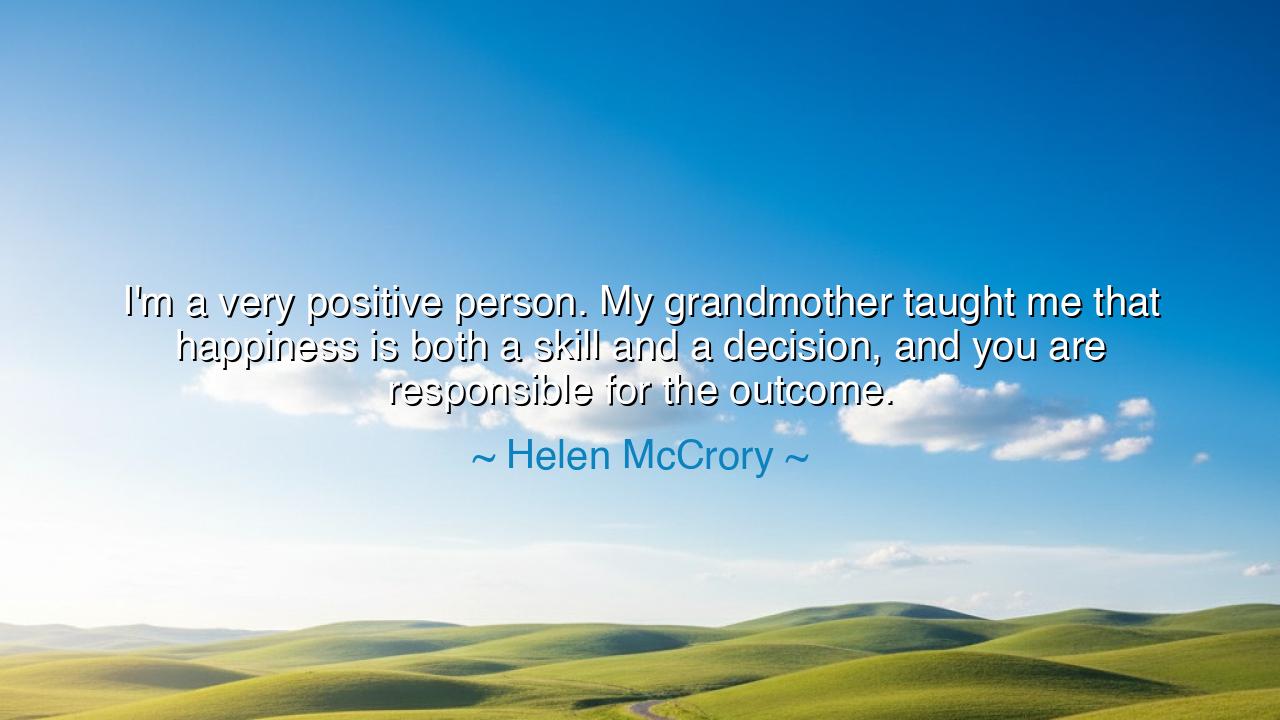
I'm a very positive person. My grandmother taught me that
I'm a very positive person. My grandmother taught me that happiness is both a skill and a decision, and you are responsible for the outcome.






The luminous actress Helen McCrory, whose spirit shone with grace and quiet power, once said: “I’m a very positive person. My grandmother taught me that happiness is both a skill and a decision, and you are responsible for the outcome.” In these words, we hear not merely the optimism of a performer, but the wisdom of generations — the distilled truth that happiness is not given, but cultivated. It does not descend like rain from heaven; it must be drawn forth like water from a deep well within the soul. McCrory’s reflection carries the echo of ancient teachings: that joy is both an art and a discipline, a practice of the spirit as real and demanding as any craft of the hand.
The origin of her words lies in her upbringing — the lessons of her grandmother, a woman shaped by times of hardship and endurance. In such generations, happiness was not a luxury; it was a necessity, a way to survive the storms of life without drowning in despair. To say that happiness is both a skill and a decision is to say that it requires both wisdom and will. A skill must be learned, practiced, refined — through patience, self-awareness, and humility. A decision must be made — again and again — to turn one’s gaze toward the light even when the shadows lengthen. Thus, McCrory teaches that happiness is not the product of circumstance, but the fruit of inner mastery.
This truth has been known to the wise of every age. The Stoic philosopher Epictetus, born into slavery, declared that happiness depends not on what happens to us, but on how we respond to it. “It is not events that disturb men,” he said, “but their judgments about them.” Likewise, the Buddha taught that peace is found not by eliminating suffering, but by transforming one’s relationship to it. McCrory’s grandmother, in her simple way, passed down the same eternal law: that we are the architects of our own inner world. To live well, one must train the heart to choose gratitude over grievance, understanding over bitterness, and purpose over self-pity.
Consider the story of Viktor Frankl, the psychiatrist and survivor of the Nazi concentration camps. Surrounded by horror, stripped of everything — home, freedom, family — he discovered one power that could never be taken from him: the power to choose his own attitude. “Everything can be taken from a man but one thing,” he wrote, “the last of the human freedoms — to choose one’s attitude in any given set of circumstances.” Like McCrory’s grandmother, Frankl understood that happiness is a decision, and that those who cultivate that decision, even in darkness, illuminate the world for others.
McCrory’s words also remind us that positivity is not denial. To be “a very positive person” does not mean to ignore pain or pretend that sorrow does not exist. Rather, it means to face life’s trials with courage and grace — to refuse to surrender one’s peace to the chaos of the world. The one who has trained in the art of happiness knows that storms will come, but has built within themselves a shelter of stillness. This is the skill her grandmother spoke of: the patient practice of returning to calm, of finding beauty in imperfection, of choosing joy not because life is easy, but because the heart is strong.
And how does one learn this skill? Through awareness. By noticing the small blessings that sustain each day — the warmth of morning light, the kindness of a stranger, the breath that still fills the lungs. Through gratitude, which transforms what we have into enough. Through discipline, which keeps the mind from wandering into envy, fear, or complaint. And through forgiveness, which frees the soul from the chains of the past. Each of these is an act of decision, a thread woven into the tapestry of happiness.
Let every listener take to heart this inheritance of wisdom: you are responsible for the outcome. The world will test you — it will break your plans, betray your expectations, and shake your peace. But you, and you alone, decide how to respond. The ancients knew that happiness, like virtue, must be practiced daily. Speak kindly, think gratefully, act justly — and the garden of joy will grow even in barren soil.
Thus, let Helen McCrory’s words live on, not as mere sentiment, but as a call to mastery of the heart. Learn the skill of happiness, as one learns music or language, through patience and repetition. Make the decision to be joyful, not because the world is perfect, but because your soul is. And when you stumble — as all must — remember the teaching of her grandmother: that happiness is not found; it is made. It is the quiet art of turning each day, however imperfect, into something luminous. In this way, you too shall embody the timeless truth — that joy is both your choice and your creation.






AAdministratorAdministrator
Welcome, honored guests. Please leave a comment, we will respond soon